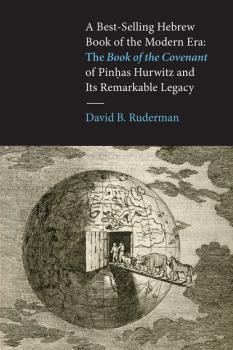ТОП просматриваемых книг сайта:
David B. Ruderman
Список книг автора David B. RudermanA Best-Selling Hebrew Book of the Modern Era - David B. Ruderman
Samuel and Althea Stroum Lectures in Jewish StudiesАннотация
In 1797, in what is now the Czech Republic, Pin as Hurwitz published one of the best-selling Hebrew books of the modern era. Nominally an extended commentary on a sixteenth-century kabbalist text, The Book of the Covenant was in fact a compendium of scientific knowledge and a manual of moral behavior. Its popularity stemmed from its ability to present the scientific advances and moral cosmopolitanism of its day in the context of Jewish legal and mystical tradition. Describing the latest developments in science and philosophy in the sacred language of Hebrew, Hurwitz argued that an intellectual understanding of the cosmos was not at odds with but actually key to achieving spiritual attainment. In A Best-Selling Hebrew Book of the Modern Era, David B. Ruderman offers a literary and intellectual history of Hurwitz�s book and its legacy. Hurwitz not only wrote the book, but was instrumental in selling it as well and his success ultimately led to the publication of more than forty editions in Hebrew, Ladino, and Yiddish. Ruderman provides a multidimensional picture of the book and the intellectual tradition it helped to inaugurate. Complicating accounts that consider modern Jewish thought to be the product of a radical break from a religious, mystical past, Ruderman shows how, instead, a complex continuity shaped Jewish society�s confrontation with modernity.
Информация о книге
Автор произведения David B. Ruderman
Аннотация
An examination of the life and work of Alexander McCaul and his impact on Jewish-Christian relations In Missionaries, Converts, and Rabbis , David B. Ruderman considers the life and works of prominent evangelical missionary Alexander McCaul (1799-1863), who was sent to Warsaw by the London Society for the Promotion of Christianity Amongst the Jews. He and his family resided there for nearly a decade, which afforded him the opportunity to become a scholar of Hebrew and rabbinic texts. Returning to England, he quickly rose up through the ranks of missionaries to become a leading figure and educator in the organization and eventually a professor of post-biblical studies at Kings College, London. In 1837, McCaul published The Old Paths , a powerful critique of rabbinic Judaism that, once translated into Hebrew and other languages, provoked controversy among Jews and Christians alike. Ruderman first examines McCaul in his complexity as a Hebraist affectionately supportive of Jews while opposing the rabbis. He then focuses his attention on a larger network of his associates, both allies and foes, who interacted with him and his ideas: two converts who came under his influence but eventually broke from him; two evangelical colleagues who challenged his aggressive proselytizing among the Jews; and, lastly, three Jewish thinkers—two well-known scholars from Eastern Europe and a rabbi from Syria—who refuted his charges against the rabbis and constructed their own justifications for Judaism in the mid-nineteenth century. Missionaries, Converts, and Rabbis reconstructs a broad transnational conversation between Christians, Jews, and those in between, opening a new vista for understanding Jewish and Christian thought and the entanglements between the two faith communities that persist in the modern era. Extending the geographical and chronological reach of his previous books, Ruderman continues his exploration of the impact of Jewish-Christian relations on Jewish self-reflection and the phenomenon of mingled identities in early modern and modern Europe.


